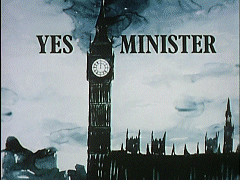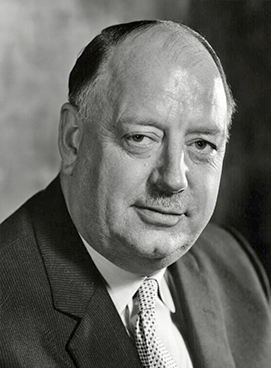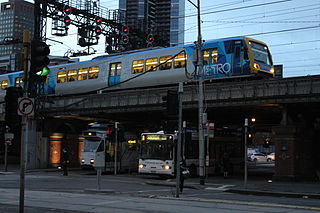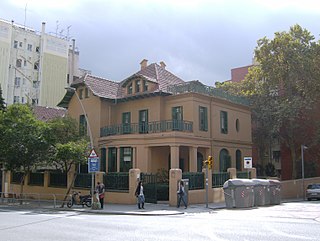Related Research Articles

Yes Minister is a British political satire sitcom written by Antony Jay and Jonathan Lynn. Comprising three seven-episode series, it was first transmitted on BBC2 from 1980 to 1984. A sequel, Yes, Prime Minister, ran for 16 episodes from 1986 to 1988. All but one of the episodes lasted half an hour, and almost all ended with a variation of the title of the series spoken as the answer to a question posed by Minister Jim Hacker. Several episodes were adapted for BBC Radio; the series also spawned a 2010 stage play that led to a new television series on Gold in 2013.

The Beeching cuts, also colloquially referred to as the Beeching Axe, were a major series of route closures and service changes made as part of the restructuring of the nationalised railway system in Great Britain in the 1960s. They are named for Dr. Richard Beeching, then-chair of the British Railways Board and the author of two reports – The Reshaping of British Railways (1963) and The Development of the Major Railway Trunk Routes (1965) – that outlined the necessity of improving the efficiency of the railways and the plan for achieving this through restructuring.

Richard Beeching, Baron Beeching, commonly known as Dr Beeching, was a physicist and engineer who for a short but very notable time was chairman of British Railways. He became a household name in Britain in the early 1960s for his report The Reshaping of British Railways, commonly referred to as The Beeching Report, which led to far-reaching changes in the railway network, popularly known as the Beeching Axe.

The Minister for Transport is a senior minister in the Government of Ireland and leads the Department of Transport.

Transport for West Midlands (TfWM) is the public body responsible for co-ordinating transport services in the West Midlands metropolitan county in England. It is an executive body of the West Midlands Combined Authority (WMCA), with bus franchising and highway management powers similar to Transport for London. TfWM's policies and strategy are set by the Transport Delivery Committee of the WMCA.

Transport in Chennai includes various modes of air, sea, road and rail transportation in the city and its suburbs. Chennai's economic development has been closely tied to its port and transport infrastructure, and it is considered one of the best infrastructure systems in India.

James George Hacker, Baron Hacker of Islington,, BSc (Lond.), Hon. D.Phil. (Oxon.) is a fictional character in the 1980s British sitcom Yes Minister and Yes, Prime Minister. He is the minister of the fictional Department of Administrative Affairs, and later Prime Minister of the United Kingdom. He was portrayed originally by Paul Eddington, with David Haig taking on the part for the 2013 revival.
A private secretary (PS) is a civil servant in a governmental department or ministry, responsible to a secretary of state or minister; or a public servant in a royal household, responsible to a member of the royal family.

Transport in Melbourne, the state capital of Victoria, Australia, consists of several interlinking modes. Melbourne is a hub for intercity, intracity and regional travel. Road-based transport accounts for most trips across many parts of the city, facilitated by Australia's largest freeway network. Public transport, including the world's largest tram network, trains and buses, also forms a key part of the transport system. Other dominant modes include walking, cycling and commercial-passenger vehicle services such as taxis.

The Metropolitan Transport Authority is a public consortium intended to coordinate the operation and project the expansion of the public transport system in the Barcelona metropolitan area. It is made up of the Government of Catalonia and local administrations. It has been known as ATM Àrea de Barcelona since 2003 to differentiate it from the other existing Catalan public transport authorities in the Girona, Camp de Tarragona and Lleida areas, which are also identified as ATM. As of January 2015, the ATM-managed public transport system comprises 50 different operating companies and serves 346 municipalities, accounting for a population of over 5.7 million.
Transport law is the area of law dealing with transport. The laws can apply very broadly at a transport system level or more narrowly to transport things or activities within that system such as vehicles, things and behaviours. Transport law is generally found in two main areas:

Bengaluru Suburban Railway is an under-construction suburban rail network for the city of Bangalore. A suburban rail system for the city was first proposed in 1983. Since then, several different route proposals were made but no suburban rail project took shape. It was finally approved in the 2019 Railway Budget.
A fare is the fee paid by a passenger for use of a public transport system: rail, bus, taxi, etc. In the case of air transport, the term airfare is often used. Fare structure is the system set up to determine how much is to be paid by various passengers using a transit vehicle at any given time. A linked trip is a trip from the origin to the destination on the transit system. Even if a passenger must make several transfers during a journey, the trip is counted as one linked trip on the system.

Public transport is a system of transport for passengers by group travel systems available for use by the general public unlike private transport, typically managed on a schedule, operated on established routes, and that may charge a posted fee for each trip. There is no rigid definition of which kinds of transport are included, and air travel is often not thought of when discussing public transport—dictionaries use wording like "buses, trains, etc." Examples of public transport include city buses, trolleybuses, trams and passenger trains, rapid transit and ferries. Public transport between cities is dominated by airlines, coaches, and intercity rail. High-speed rail networks are being developed in many parts of the world.

The Transport Legislation Review is a policy and legislation review project conducted by the Department of Transport in the State of Victoria, Australia between 2004 and late 2010. The aim of the project was review of transport policy and laws and generation of new policy and legislation as a platform for better transport across the State.

The Department of Transport (DOT) was the government agency responsible for the coordination, integration and regulation of the transport system in the State of Victoria, Australia. The department generated planning, policy, and legislation for transport in Victoria. As a result, the department drove the integration of Victoria's transport land and water transport systems and the delivery of public transport, road and port services and associated activities across the State. The department's stated mission was "Building a safer, fairer and greener transport system for all Victorians to create a more prosperous and connected community."

Transport for NSW (TfNSW) is a New South Wales Government transport services and roads agency established on 1 November 2011. The agency is a different entity to the NSW Department of Transport, which is a department of the state government of New South Wales, and the ultimate parent entity of Transport for NSW.

The Ministry of Transport, abbreviated MOT, is a ministry of the Government of Malaysia that is responsible for transport: road transport, civil aviation, road safety, port authority, maritime, air accident investigation, logistic and maritime safety. The ministry is headquartered in Putrajaya.
Coimbatore Metro, also known as Kovai Metro, is a proposed rapid transit system for Coimbatore, Tamil Nadu.
The North Wales Metro is a rail and bus transport improvement programme in north Wales. Styled as a "Metro", it is conceptually a multi-modal system with a combination of bus, heavy rail, and light rail services. It was initially focused on linking major settlements and employment areas of the north-east of Wales with the North West of England, with its hubs located in Wrexham, Chester and Deeside, although the programme has since expanded, with proposals extending to Anglesey in the north-west of Wales. The existing Borderlands line forms a core rail component of the network, where projects to increase connections, integrated access, and service frequency between Wrexham, Deeside and Liverpool are centred upon. The proposals were put forward in 2016 as is part of Welsh Labour's plan for north Wales. Labour has pledged to open the system by 2035. The proposals were included in the 2018 Wales & Borders franchise contest. It is the second of the three regional metros proposed by the Welsh Government to go ahead, after the South Wales Metro, and before the Swansea Bay and West Wales Metro. The project is described to be in its initial phases.
References
- ↑ "Special report: You simply couldn't make it up, Minister". fleetnews.co.uk. Retrieved 2 October 2020.
- ↑ "Transport policy in 2010: a rough guide" (PDF).
- ↑ "Commission for Integrated Transport".
The Commission for Integrated Transport (CfIT) is an independent body advising the Government on integrated transport policy. CfIT takes a broad view of integrated transport policy and its interface with wider Government objectives for economic prosperity, environmental protection, health and social inclusion. Physical integration - the principle of ensuring transport modes operate in conjunction with one another, is just one vital element of the bigger transport picture. The Commission provides expert advice supported by independent research. CfIT was established in the 1998 Integrated Transport White Paper 'to provide independent advice to Government on the implementation of integrated transport policy, to monitor developments across transport, environment, health and other sectors and to review progress towards meeting our objectives'.
- ↑ "CSR: Government kills off Commission for Integrated Transport". Road Transport. Archived from the original on 29 October 2010.
- ↑ "Local Transport Bill". Parliament.
- ↑ "Integrated Transport Economics and Appraisal". Department for Transport.
Our aims are to ensure that decisions on transport policy are made in the light of the best possible advice on their impacts, and to ensure that investment in all modes of transport and their management meets the Department's policy objective to seek good value for money... We are developing a strategic National Transport Model for use by the Department in the assessment of a range of transport policy options. The Model uses data on how people travel according to their circumstances and where they live. It takes into account the choices available and the use people make of the different modes of transport - car, rail, bus, walk and cycle. The Model relates the way people travel to cost, time and convenience of each alternative. It can therefore help to predict how improvements in public transport or in roads influence the modes people use and the impact of these improvements on congestion and emissions
- ↑ "About". ITSO.
- ↑ "Local Transport White Paper – Creating Growth, Cutting Carbon: Making Sustainable Transport Happen".